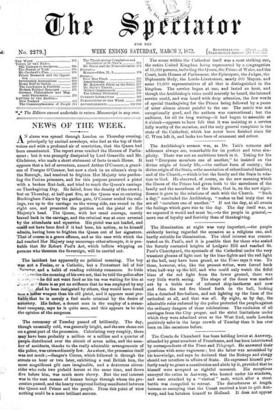The ceremony of Tuesday passed off brilliantly. The day, though
unusually cold, was generally bright, and the sun shone out on a great part of the procession. Calculating very roughly, there may have been probably a million or a million and a quarter of people distributed over the circuit of seven miles, and the num- ber of accidents, thanks to the really admirable arrangements of the police, was extraordinarily few. As a show, the procession itself was not much ;--Sanger's Circus, which followed it through the streets an hour or two later, exhibiting a real British lion, the most magnificent gilt cars imaginable, and a dexterous circus- rider who rode two piebald horses at the same time, and drove five before him, was much more showy. But the real interest was in the vast masses of human beings through whom the pro- cession passed, and the hearty reciprocal feeling manifested between the Queen and Prince and the people. From this point of view nothing could be a more brilliant success. The scene within the Cathedral itself was a most striking one, the entire United Kingdom being represented by a congregation of 13,000 persons, including the Queen, the Prince of Wales, and the Court, both Houses of Parliament, the Episcopate, the Judges, the Diplomatic Body, the Lords-Lieutenant, nearly 300 Mayors, and some 10,000 representatives of all that ii distinguished in the kingdom. The service began at one, and lasted an hour, and though the Archbishop's voice could scarcely be heard, the intoned service could, and was heard with deep attention, the few words of special thanksgiving for the Prince being followed by a pause of utter silence almost painful to the ear. The music was not exceptionally good, and the anthem was conventional; but the audience, for all its long waiting—it had begun to assemble at 8 o'clock—appears to have felt that it was assisting at a service fully worthy of the occasion, and the only general complaint is the state of the Cathedral, which has never been finished since Sir C. Wren left it, and looks too bare of ornament and colour.


































